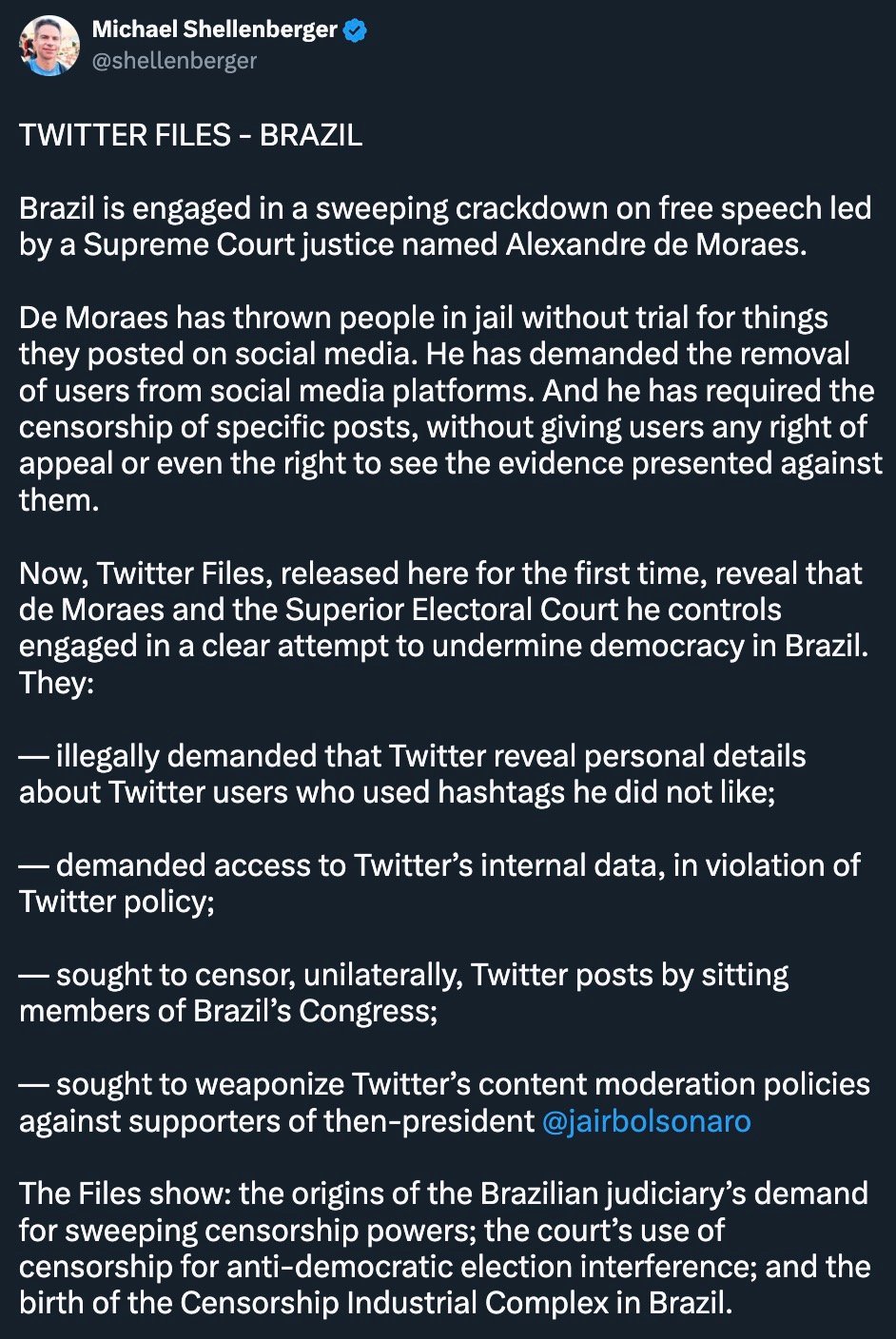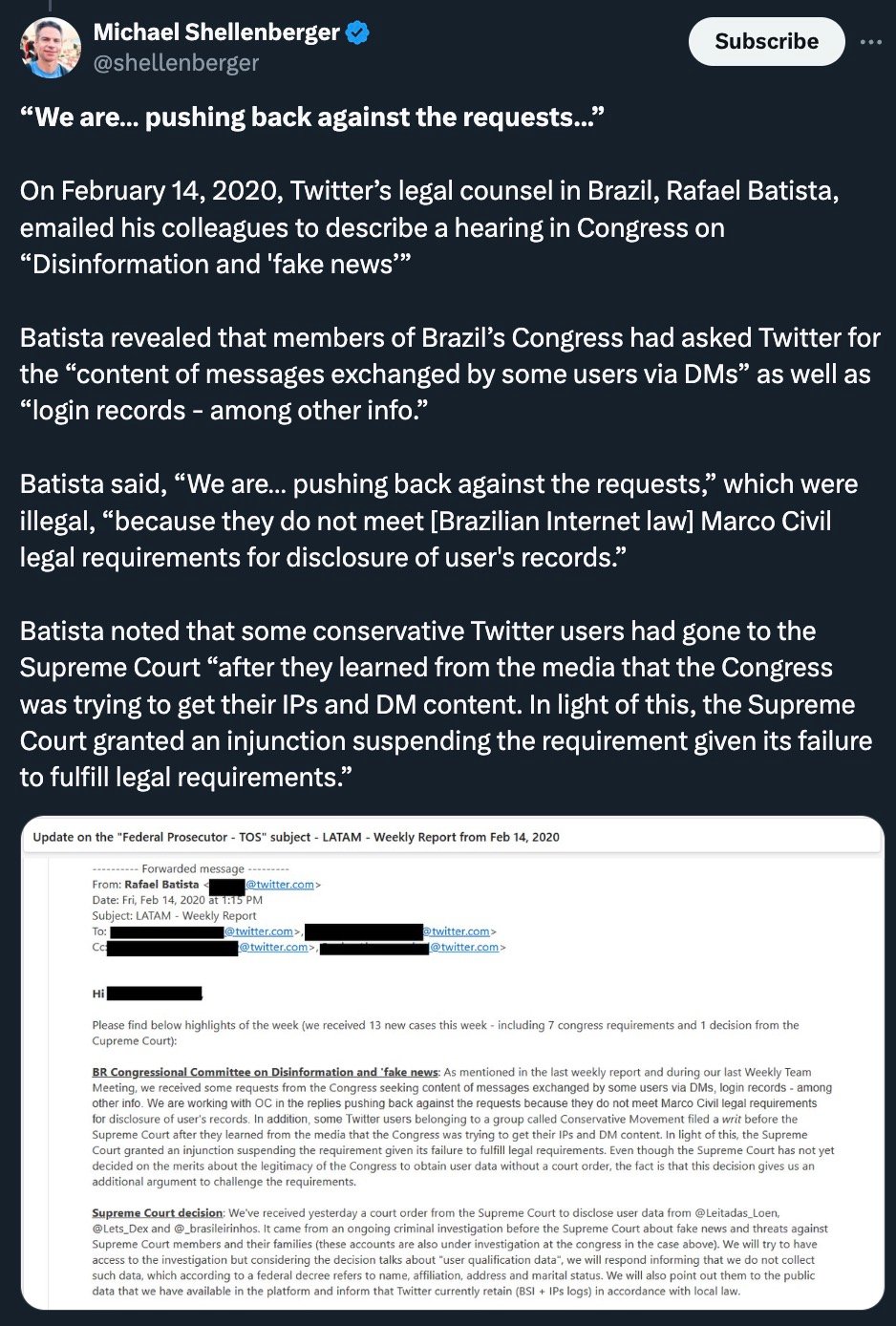The latest development in the Twitter Files suggests that a concerted initiative backed by the Brazilian government is threatening freedom of speech across the globe in coordination with various high-profile tech companies. According to the allegations brought forth by investigative journalist Michael Shellenberger, former Brazilian president Jair Bolsonaro’s supporters are specifically in the crosshairs of this extensive campaign.
At the helm of this scheme, as Shellenberger suggests, is Alexandre de Moraes, the superior electoral court’s chief and a participant in Supreme court proceedings and someone whose push for censorship has been documented heavily.
He is purportedly leading a combined legislative and judicial endeavor to stifle political dissent. Shellenberger unveils some quite disturbing actions allegedly enforced by de Moraes, including imprisoning individuals sans trial for content shared on the web, the requirement of user-removal from social media sites and specific content censorship without the ability to appeal or access evidence produced against them.

Reclaim Your Digital Freedom.
Get unfiltered coverage of surveillance, censorship, and the technology threatening your civil liberties.
Another disconcerting aspect of this politically-motivated censorship campaign in Brazil concerns the use of user data from major tech companies. Shellenberger’s expose points out that companies like Google, Facebook, Uber, Instagram and WhatsApp have assisted the government by sharing registration data and contact numbers in absence of court orders or firm legal grounds for such disclosure. Rafael Batista, Twitter’s legal representative in Brazil, is contending these intrusive court orders for private data. However, Google’s complicity, in particular, has soured Twitter’s resistance.

During the two-year span, several Brazilian courts, notably the Superior Electoral Court, made multiple attempts to access Twitter users’ log-in records, direct message content, and unmask users using specific hashtags or who retweeted certain content. Interestingly, some of these demands targeted users outside Brazil. Twitter’s legal team, including Batista, faced police investigation for contesting these requests, citing non-compliance with legal disclosure requirements and infringement on privacy laws.
In 2021, Batista claimed that a public prosecutor alleged Big Tech companies like Google, Facebook, Uber, WhatsApp, and Instagram provided user data to Brazilian authorities without requiring a court order. This assertion included an incident where Google reportedly handed over 200 gigabytes of YouTube videos to the Brazilian Senate, which were linked to the government’s COVID-19 response investigation. This action by Google was labeled as a “very concerning precedent” by Batista, especially given Twitter’s resistance to similar requests.
Shellenberger also highlights that while Twitter resisted the initiation of illegitimate criminal cases and various other suits, it admitted to muzzling someone for their comments about COVID-19. It was revealed that once the supporters of Bolsonaro started challenging the actions of Brazil’s key government entities, namely TSE & STF, the courts pursued to de-platform and suppress these individuals on the internet. Well-known associates of Bolsonaro, including his son Carlos, were affected by these crackdowns. Additionally, the Superior Electoral Court demanded the demonetization of accounts belonging to Bolsonaro supporters. These actions appear separate from the censorship of Bolsonaro supporters on Twitter in late 2022.
According to Twitter’s Head of Legal, Diego de Lima Gualda, there is a significant political tinge to this investigation with courts exerting pressure for compliance with certain requirements by attempting to lower the impact of specific content and trending hashtags.
Incidentally, some time around November of 2021, an appeals court directed Twitter to globally remove various specific URLs associated with a plaintiff. In an even more alarming turn of events, by March this year, even Brazil’s Federal Police — equivalent to FBI — had joined the TSE-directed investigation.
Adding another wrinkle to this widespread assault on free speech, Shellenberger reported that Twitter eventually gave into the orders from de Moraes, despite initial resistance.
With the Brazilian government still escalating its censorship efforts, Shellenberger warns that it is the democratic system that stands on losing ground.
Read Shellenberger’s full thread here.




